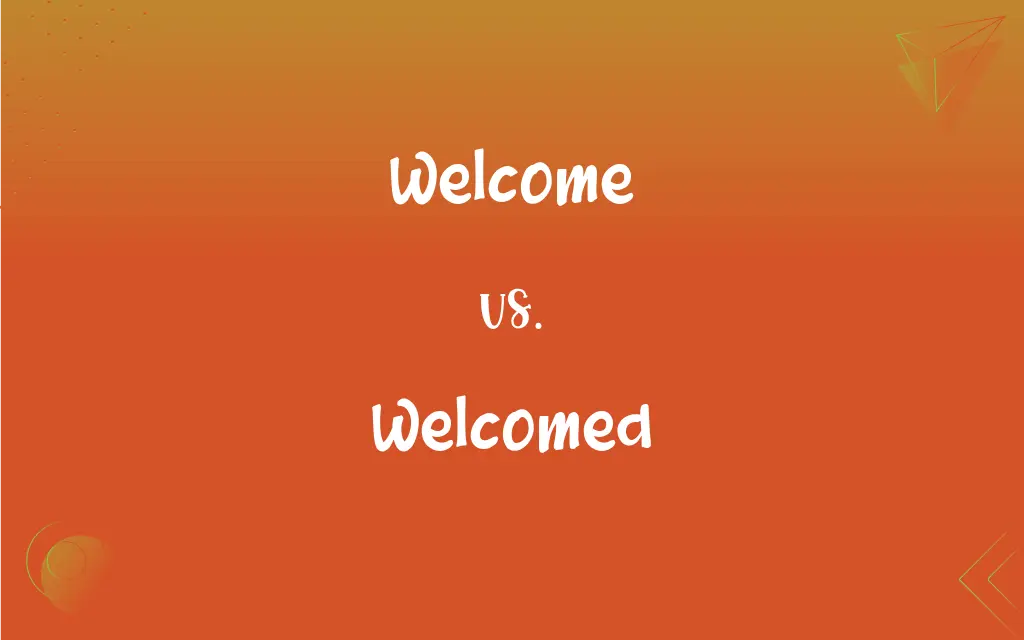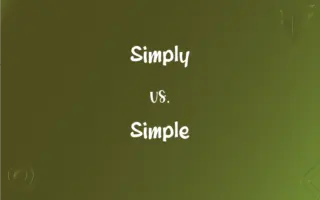Welcome vs. Welcomed: What's the Difference?
By Janet White || Updated on March 4, 2024
Welcome is used as an adjective, noun, or interjection to greet or express pleasure at someone's arrival. Welcomed is the past tense or past participle of the verb "welcome," indicating the action of receiving someone warmly.

Key Differences
As an adjective, "welcome" describes something or someone received with pleasure and hospitality, such as in "You are always welcome at our home." As a noun or interjection, it expresses a greeting or reception, like in "Welcome!" or "A warm welcome awaited them." "Welcomed," on the other hand, is used to describe an action that has already taken place, indicating that someone has been greeted warmly upon arrival, as in "They were welcomed with open arms."
"Welcome" can also function as a verb in its base form, implying the act of greeting someone with pleasure, for instance, "We welcome all guests with a smile." When using "welcomed" in a sentence, it often requires an auxiliary verb to indicate the time frame of the welcoming action, such as "The guests were welcomed by the host."
The choice between "welcome" and "welcomed" depends on the grammatical structure and the intended meaning of the sentence. "Welcome" is versatile, serving various grammatical roles, while "welcomed" specifically refers to the act of welcoming someone in the past.
Both "welcome" and "welcomed" convey a sense of warmth and hospitality but are used differently within sentences. "Welcome" can set the tone of a message or conversation with its immediate warmth, whereas "welcomed" often reflects on a hospitable act that has already occurred.
Despite their differences, both terms share the root of hospitality and friendliness. Whether welcoming someone in the present or reflecting on a past welcome, the essence is to make others feel appreciated and valued in the given environment.
ADVERTISEMENT
Comparison Chart
Part of Speech
Adjective, noun, verb, interjection.
Past tense or past participle of the verb.
Usage
To greet, express pleasure at arrival, or describe something/someone pleasing.
To indicate the action of having received someone warmly in the past.
Example Sentence
"You are welcome to join us."
"They were welcomed at the door."
Function
Sets the tone of hospitality or greeting in present terms.
Reflects on the act of welcoming after it has occurred.
Requirement
Can stand alone or be part of a verb phrase.
Requires an auxiliary verb in passive constructions.
ADVERTISEMENT
Welcome and Welcomed Definitions
Welcome
Used as a greeting or to express pleasure at someone's arrival.
Welcome to our home!
Welcomed
Indicates someone was greeted warmly in the past.
The guests were warmly welcomed.
Welcome
Describes something pleasing or approved.
Your help is very welcome.
Welcomed
Reflects a completed action of hospitality.
The new ideas were welcomed by the team.
Welcome
To greet or receive someone warmly.
We welcome feedback from our clients.
Welcomed
Used in perfect tenses to indicate past actions.
They have always welcomed newcomers.
Welcome
Received with pleasure and hospitality into one's company or home
A welcome guest.
Welcomed
Suggests a sense of acceptance.
I felt welcomed by the community.
Welcome
Giving pleasure or satisfaction; agreeable or gratifying
A welcome respite from hard work.
Welcomed
Received with pleasure and hospitality into one's company or home
A welcome guest.
Welcome
Cordially or willingly permitted or invited
You are welcome to join us.
Welcomed
Giving pleasure or satisfaction; agreeable or gratifying
A welcome respite from hard work.
Welcome
Used in the expression you're welcome to acknowledge an expression of gratitude.
Welcomed
Cordially or willingly permitted or invited
You are welcome to join us.
Welcome
A cordial greeting or hospitable reception given to an arriving person.
Welcomed
Used in the expression you're welcome to acknowledge an expression of gratitude.
Welcome
A reception upon arrival
Gave the stranger an unfriendly welcome.
Welcomed
A cordial greeting or hospitable reception given to an arriving person.
Welcome
The state of being welcome
Don't overstay your welcome.
Welcomed
A reception upon arrival
Gave the stranger an unfriendly welcome.
Welcome
To greet, receive, or entertain (another or others) cordially or hospitably.
Welcomed
The state of being welcome
Don't overstay your welcome.
Welcome
To receive or accept gladly
Would welcome a little privacy.
Welcomed
To greet, receive, or entertain (another or others) cordially or hospitably.
Welcome
Used to greet cordially a visitor or recent arrival.
Welcomed
To receive or accept gladly
Would welcome a little privacy.
Welcome
Whose arrival is a cause of joy; received with gladness; admitted willingly to the house, entertainment, or company.
A welcome visitor
Refugees welcome to education!
Welcomed
Used to greet cordially a visitor or recent arrival.
Welcome
Producing gladness.
A welcome present;
Welcome news
Welcomed
Having received a warm welcome.
I felt so welcomed at your party last night.
Welcome
Free to have or enjoy gratuitously.
You are welcome to the use of my library.
Welcomed
Simple past tense and past participle of welcome
Welcome
Greeting given upon someone's arrival.
Welcomed
Gladly and cordially received or admitted
Welcome
The act of greeting someone’s arrival, especially by saying "Welcome!"; reception.
Welcomed
Often used in passive constructions.
She was welcomed into the fold.
Welcome
The utterance of such a greeting.
Welcome
Kind reception of a guest or newcomer.
We entered the house and found a ready welcome.
Welcome
The state of being a welcome guest.
Welcome
To affirm or greet the arrival of someone, especially by saying "Welcome!".
Welcome
To accept something willingly or gladly.
We welcome suggestions for improvement.
Welcome
Received with gladness; admitted willingly to the house, entertainment, or company; as, a welcome visitor.
When the glad soul is made Heaven's welcome guest.
Welcome
Producing gladness; grateful; as, a welcome present; welcome news.
Welcome
Free to have or enjoy gratuitously; as, you are welcome to the use of my library.
Welcome
Salutation to a newcomer.
Welcome
Kind reception of a guest or newcomer; as, we entered the house and found a ready welcome.
His warmest welcome at an inn.
Truth finds an entrance and a welcome too.
To thee and thy company I bidA hearty welcome.
Welcome
To salute with kindness, as a newcomer; to receive and entertain hospitably and cheerfully; as, to welcome a visitor; to welcome a new idea.
Thus we salute thee with our early song,And welcome thee, and wish thee long.
Welcome
The state of being welcome;
Don't outstay your welcome
Welcome
A greeting or reception;
The proposal got a warm welcome
Welcome
Accept gladly;
I welcome your proposals
Welcome
Bid welcome to; greet upon arrival
Welcome
Receive someone, as into one's house
Welcome
Giving pleasure or satisfaction or received with pleasure or freely granted;
A welcome relief
A welcome guest
Made the children feel welcome
You are welcome to join us
Welcome
The act or manner of greeting.
They gave the newcomers a warm welcome.
Welcome
An exclamation to greet.
Welcome! We're glad you're here.
FAQs
Is it correct to say "You're welcomed" instead of "You're welcome"?
Typically, "You're welcome" is the correct response to thanks, while "You're welcomed" is less common and might be used to emphasize that someone was warmly received.
Can "welcome" be used as a verb?
Yes, "welcome" can be used as a verb meaning to greet or receive someone warmly.
How do I know when to use "welcome" or "welcomed"?
Use "welcome" as an adjective, noun, verb, or interjection in present tense contexts, and "welcomed" when referring to a past action of welcoming.
Can "welcome" be used to describe things as well as people?
Yes, "welcome" can describe anything that is received with pleasure, not just people.
Is "welcomed" always used in a positive context?
While generally positive, "welcomed" can be used in neutral or even ironic contexts, depending on tone and context.
Is "welcomed" only used in past tense?
"Welcomed" is the past tense and past participle of "welcome," used to indicate a past action or in perfect tenses.
Can "welcomed" be used without an auxiliary verb?
"Welcomed" typically requires an auxiliary verb in passive constructions but can be used without one in perfect tense forms, e.g., "They have welcomed."
What is the noun form of "welcome"?
The noun form is also "welcome," referring to the act or manner of greeting, e.g., "The welcome at the hotel was warm."
Can "welcome" be used sarcastically?
Yes, "welcome" can be used sarcastically in context, implying the opposite of a warm reception.
Is "You are welcomed" grammatically correct?
While grammatically correct, "You are welcomed" is less commonly used than "You are welcome" in response to thanks.
How does "welcome aboard" differ from "welcome"?
"Welcome aboard" is a specific expression used to greet someone new to a team or organization, implying they're joining a collective effort.
Can "welcome" be used as a closing in a letter?
It's unusual as a closing; more common closings include "Sincerely" or "Best regards," but "welcome" might be used in a specific context inviting further communication.
How do I use "welcome" in a formal invitation?
In a formal invitation, you might use "welcome" to express hospitality, e.g., "You are cordially welcome to attend..."
How do you respond to "You're welcome"?
A common response might be "Thank you" or "I appreciate it," acknowledging the initial thanks.
Can "welcome" imply obligation?
Rarely, "welcome" can imply a polite obligation, especially in formal contexts, but it primarily conveys genuine hospitality.
What is the imperative form of "welcome"?
The imperative form is "welcome," used to give a command or invitation, e.g., "Welcome our guests warmly."
What does "Your presence is welcome" mean?
This phrase means that someone's presence is appreciated or desired in a particular setting or event.
What is the antonym of "welcome"?
Antonyms include "unwelcome," "rejected," or "unwanted," depending on the context.
Is there a plural form for "welcome"?
"Welcome" as a noun or adjective doesn't have a plural form, but as a verb, its conjugations can vary, e.g., "We welcome all comments."
How is "welcome" used in different cultures?
The usage of "welcome" can vary, but it generally conveys hospitality and warmth across different cultures, often accompanied by specific rituals or phrases.
About Author
Written by
Janet WhiteJanet White has been an esteemed writer and blogger for Difference Wiki. Holding a Master's degree in Science and Medical Journalism from the prestigious Boston University, she has consistently demonstrated her expertise and passion for her field. When she's not immersed in her work, Janet relishes her time exercising, delving into a good book, and cherishing moments with friends and family.































































